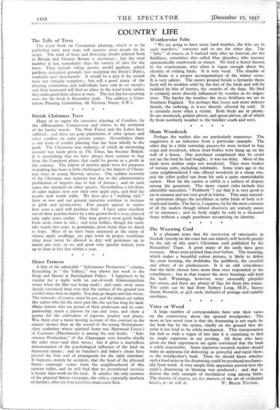British Christmas Trees Many of us regret the excessive planting
of Conifers, by the Afforestation Commission and others, to the exclusion of the harder woods. The New Forest and the Lakes have suffered ; and there are grim plantations of sitka spruce and other conifers on some private estates. Nevertheless there is one form of conifer planting that has been wholly to the good. The Christmas tree industry, of which an interesting account was lately given in The Times, has become British. It is astonishing that we have always been content to buy from the Continent plants that could be grown at a profit in this country. The import of maiden apple trees for purposes of grafting has been as little challenged as the import of Christ- mas trees or young Norway spruces. The sudden recovery of the Christmas tree industry was due to the administrative prohibition of imports due to fear of disease ; and no such cause has operated on other species. Nevertheless, a few firms of cider makers now sow their own apple pips, and find the results well worth while. We have also a " walking stick " farm or two and our general nurseries continue to increase in girth and productivity. Few people appear to realise how soon a seed will produce fruit. I have eaten excellent out-of-door peaches borne by a tree grown from a stone planted only eight years earlier. One may grow a stout quick hedge from seeds sown in situ ; and even hollies, though the seeds take nearly two years to germinate, grow faster than we dared to hope. Most of us have been surprised at the rarity of chance apple seedlings, yet pips sown in proper conditions (they must never be allowed to dry) will germinate up to ninety per cent, or so, and grow very quickly indeed, even up to four or five feet within a year.














































 Previous page
Previous page